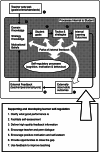Experiences of soft skills development and assessment by health sciences students and teachers: a qualitative study
- PMID: 40389931
- PMCID: PMC12087106
- DOI: 10.1186/s12909-025-07289-2
Experiences of soft skills development and assessment by health sciences students and teachers: a qualitative study
Abstract
Background: Soft skill development is of growing importance in higher education. However, the definitions of soft skills are unclear and soft skill development and assessment in higher education are underexplored. Therefore, the research question of this study is as follows: What are the experiences of teaching staff and students of the bachelor's internship in health sciences regarding soft skills development and assessment?
Methods: For this qualitative study, using a phenomenological approach, sixteen participants (ten university teachers and six bachelor students) were interviewed via semi structured interviews, based on the theoretical framework of Nicol & Macfarlane's model of self-regulation. The results were analysed through thematic analysis.
Results: The experiences of soft skills were divided into eight themes related to development and assessment. In terms of development, it is [1] important to show a growth in soft skills. This development depends on [2] the perceived guidance provided by teachers [3], the type of internships, and [4] the perceived supervision in soft skills. Regarding assessment [5], teachers often struggle to evaluate soft skills, highlighting [6] the need for durable assessment of soft skills. Additionally [7], both students and teachers feel a need for more focus on soft skills in education. Furthermore [8], several prior factors, such as acknowledgement of soft skills and self-reflection skills, are mentioned to optimise student development.
Conclusion: This study highlights the importance of soft skills development and assessment in higher education. A clear definition of soft skills is recommended. Our findings demonstrate how teachers struggle with their role in soft skills supervision and assessment, with the consequence that students experience a lack of supervision and assessment in soft skills development.
Keywords: Assessment; Development; Soft skills; University students.
© 2025. The Author(s).
Conflict of interest statement
Declarations. Ethics approval and consent to participate: The study protocol was approved by The Research Ethics Review Committee of the Faculty of Science, Vrije Universiteit Amsterdam (BETCHIE), with review number 22–48. All participants were informed in writing and face-to-face about the aims, implications, and ethical aspects of the study. Informed consent was signed by all the participants. Consent for publication: Not applicable. Competing interests: The authors declare no competing interests.
Figures
References
-
- Noah JB, Aziz AA. A systematic review on soft skills development among university graduates. EDUCATUM J Social Sci. 2020;6(1):53–68.
-
- Clarke M. Rethinking graduate employability: the role of capital, individual attributes and context. Stud High Educ. 2018;43(11):1923–37.
-
- James S, Warhurst C, Tholen G, Commander J. What we know and what we need to know about graduate skills. Work Employ Soc. 2013;27(6):952–63.
-
- Rao JK, Anderson LA, Inui TS, Frankel RM. Communication interventions make a difference in conversations between physicians and patients: a systematic review of the evidence. Med Care. 2007:340–9. - PubMed
MeSH terms
LinkOut - more resources
Full Text Sources



